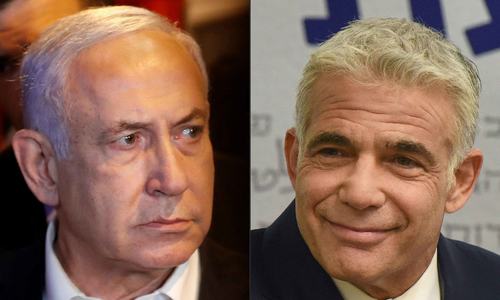It was a photo opportunity for the history books: A politician from Israel's Arab minority grinning alongside a far-right Jewish leader and his allies, moments after endorsing him as prime minister and handing him a governing majority.
Common cause against Prime Minister Benjamin Netanyahu helped bring Mansour Abbas into the political fold late on Wednesday, his tiny faction securing a paper-thin majority for Jewish parties hoping to unseat Israel's longest-serving premier.
The United Arab List would be the first party drawn from the country's 21 per cent Arab minority — Palestinian by heritage, Israeli by citizenship — to join an Israeli government, whose parliamentary approval is still pending.
Abbas, 47, has cast aside differences with prime minister-hopeful Naftali Bennett, a former leader of a major Jewish settlement organisation and an advocate of annexing most of the occupied West Bank — land Palestinians seek for a state.
A dentist by profession, Abbas says he hopes to improve conditions for Arab citizens, who complain of discrimination and government neglect.
"We decided to join the government in order to change the balance of political forces in the country," he said in a message to supporters after signing a coalition agreement with Bennett and opposition leader Yair Lapid.
Abbas's party said that the agreement includes the allocation of more than 53 billion shekels ($16bn) to improve infrastructure and combat violent crime in Arab towns.
The agreement also includes provisions freezing demolition of homes built without permits in Arab villages and granting official status to Bedouin towns in the Negev desert, a stronghold for Islamist support, the party said.
"I say here clearly and frankly: when the very establishment of this government is based on our support ... we will be able to influence it and accomplish great things for our Arab society," Abbas said.
Fragile coalition
Abbas is from the Arab and Druze village of Maghar, near the Sea of Galilee. His party is the political wing of the southern branch of Israel's Islamic Movement, which was established in 1971 and traces its origins to the Muslim Brotherhood.
Before agreeing to a coalition deal, Abbas sought and received approval from the Islamic Movement's advisory Shura Council, a religious body, which has guided the party's past votes in parliament on LGBT rights and other issues.
Abbas's party split from Israel's main Arab coalition, the Joint List, before a March 23 election after advocating, unsuccessfully, that they work with Netanyahu and other right-wing factions to improve living conditions for Arabs.
Many Arabs criticise Abbas's approach, asking how he could justify belonging to a government that imposes a military occupation over their Palestinian brethren in the West Bank and leads a blockade of Hamas-ruled Gaza.
"He should be commended for trying something new, but if there's another war with Gaza, and he's in government, there will be pressure on him to abandon ship," said Moussa al-Zayadna in the Bedouin town of Rahat in southern Israel.
The Joint List, which won six seats in the election, has not commented on Abbas's decision to join the coalition.
Former Joint List member Jamal Zahalka called the alliance "a sin, not just a mistake" and said Abbas's move came "at the expense of our national position, rights and dignity".
Abbas temporarily halted coalition negotiations during an 11-day period of violence by Israel against Gaza last month that also saw violent incidents between Jews and Arabs within Israel.
But the decision to join a coalition was a strategic, long-term view, said Arik Rudnitzky of the Israel Democracy Institute.
"He would not withdraw such a strategic option just because of violent events," Rudnitzky said.
"I think that if they (Arabs) waited 70 years to enter government, they can stand 70 days of violence with Gaza."














































